|
A.S.S.E.Psi.
web site (History of Psychiatry and Psychoanalytic Psychotherapy
)
A.S.S.E.Psi.NEWS
(to subscribe our monthly newsletter)
Ce.Psi.Di. (Centro
di Psicoterapia Dinamica "Mauro Mancia")
Maitres
à dispenser (Our reviews about psychoanalytic congresses)
Biblio
Reviews (Recensioni)
Congressi
ECM (in italian)
Events
(our congresses)
Tatiana Rosenthal
and ... other 'psycho-suiciders'
Thalassa.
Portolano of Psychoanalysis
PsychoWitz - Psychoanalysis and Humor (...per ridere un po'!)
Giuseppe Leo's Art
Gallery
Spazio
Rosenthal (femininity and psychoanalysis)
Psicoanalisi
Europea Video
Channel
A.S.S.E.Psi. Video
Channel
Ultima uscita/New issue:
"My
Ideas Felt Like Outsize Clothes. A tale for Etty Hillesum"
(Second Edition)
by
Giuseppe Leo
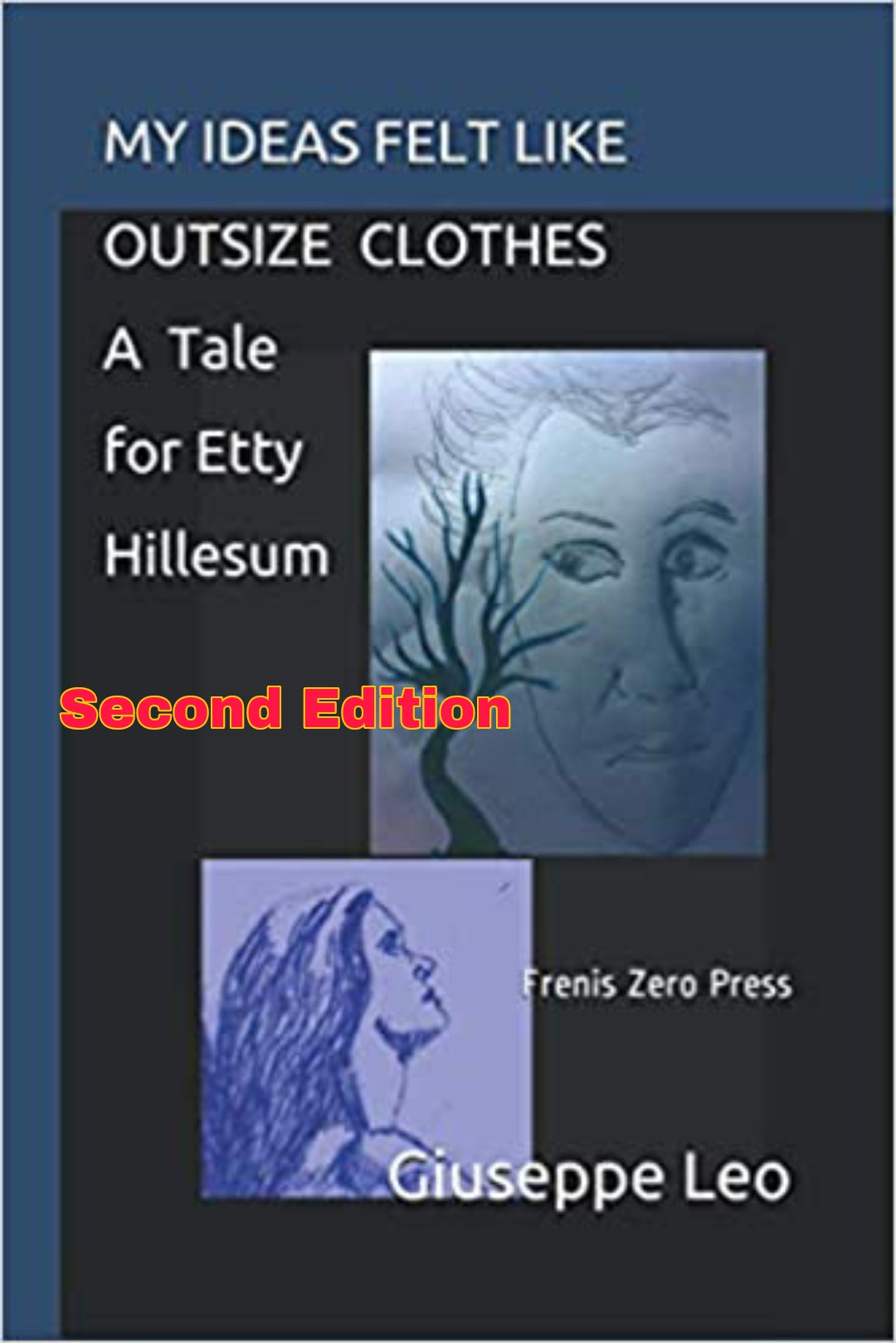
Editore/Publisher: Edizioni Frenis Zero
ISBN: 978-88-97479-28-4
Anno/Year: 2021
Pages: 128
Click
here to buy the book/Compra su Amazon

"Infant
Research and Psychoanalysis" (Third Edition) edited
by Giuseppe Leo
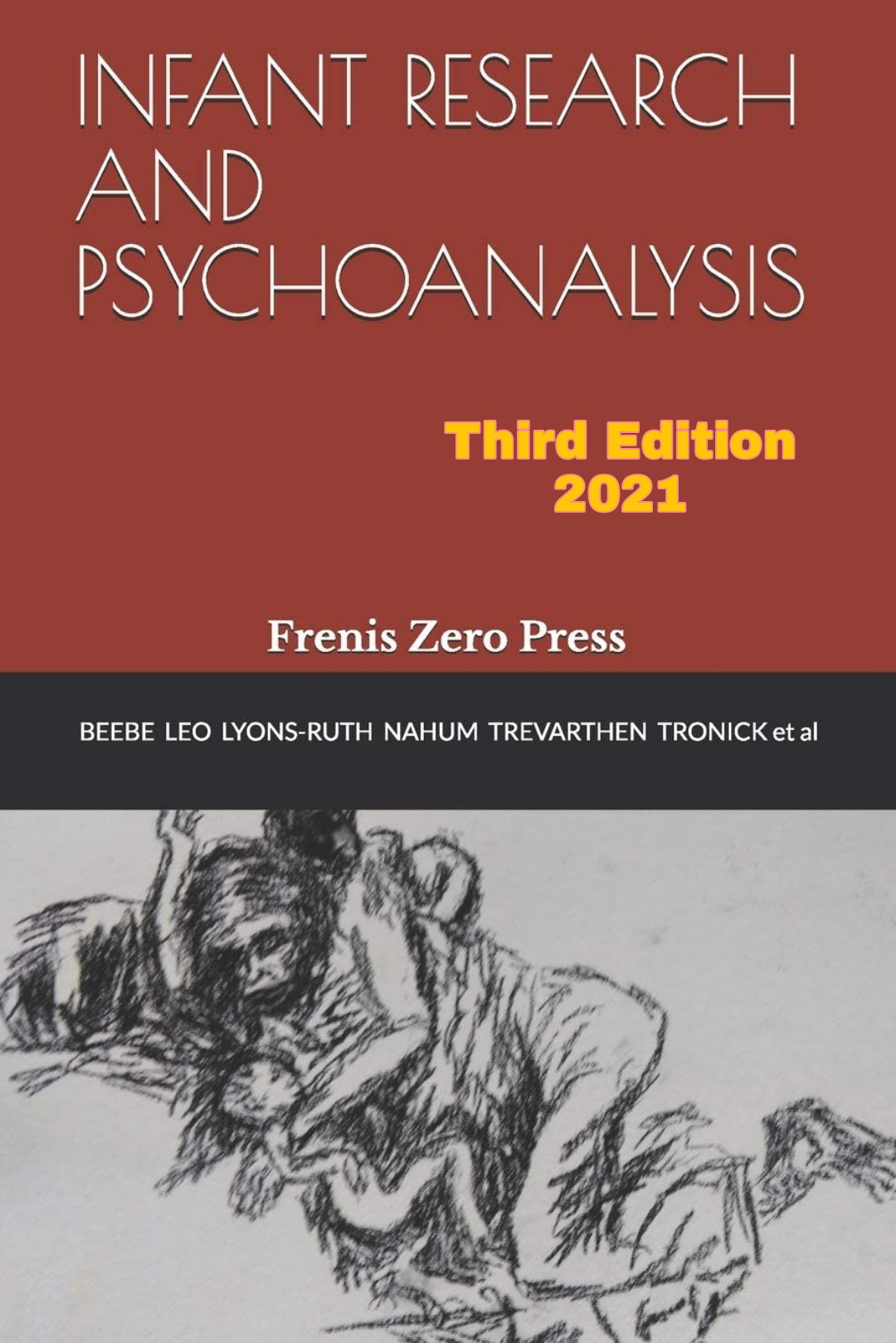
"
Edited
by Giuseppe Leo
Writings
by: B. Beebe K.
Lyons-Ruth J. P. Nahum D. Schechter
E. Solheim C.
Trevarthen E. Z. Tronick
L.
Vulliez-Coady
Publisher:
Frenis Zero
Collection:
Borders of Psychoanalysis
Year:
2021
Pages:
285
ISBN: 978-88-97479-24-6
Click
here to buy the book/Compra su Amazon

"Psychanalyse,
Lieux de Mémoire et Traumatismes Collectifs" (Third
Edition) edited by
Giuseppe Leo
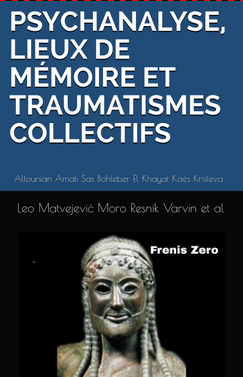
Writings by: J. Altounian, S. Amati Sas, W.
Bohleber, M. El Husseini, R. El Khayat, Y. Gampel R. Kaës, J.
Kristeva, G. Leo, A. Loncan, P. Matvejević, M.-R. Moro, S.
Resnik, S. Varvin
Editore/Publisher: Edizioni Frenis Zero
ISBN: 978-88-97479-22-2
Anno/Year: 2021
Pages: 546
Click
here to buy the book/Compra su Amazon

"Enactment
in Psychoanalysis" - Second Edition) edited by
Giuseppe Leo & Giuseppe Riefolo

Edited
by Giuseppe Leo & Giuseppe Riefolo
Writings
by: G. Atlas E. Ginot J.R.
Greenberg J. Kraus J.D. Safran
Publisher:
Frenis Zero
Collection:
Borders of Psychoanalysis
Year:
2020
Pages:
333
ISBN: 978-88-97479-19-2
Click
here to buy the book/Compra su Amazon

"My
Ideas Felt Like Outsize Clothes. A tale for Etty Hillesum" by
Giuseppe Leo
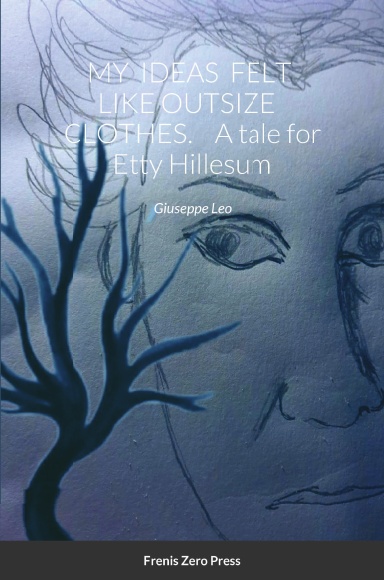
Editore/Publisher: Edizioni Frenis Zero
ISBN: 978-88-97479-33-8
Anno/Year: 2020
Pages: 122
Click
here to order the book/Ordina
su Lulu

"Environmental
Crisis and Pandemic. A Challenge for Psychoanalysis"
edited by Giuseppe Leo (Second
Edition)

Writings by: H. Catz, A. Ferruta,
M. Francesconi, P. R. Goisis, R. D. Hinshelwood, G.
Leo, N. McWilliams,
G. Riefolo, M. Roth, C.
Schinaia, D. Scotto Di Fasano, R. D. Stolorow
Editore/Publisher: Edizioni Frenis Zero
ISBN: 978-88-97479-37-6
Anno/Year: 2020
Pages: 312
Click
here to order the book/Ordina
su Lulu

Click
here to buy the book/Compra su Amazon

"Psychanalyse,
Lieux de Mémoire et Traumatismes Collectifs" sous
la direction de Giuseppe Leo
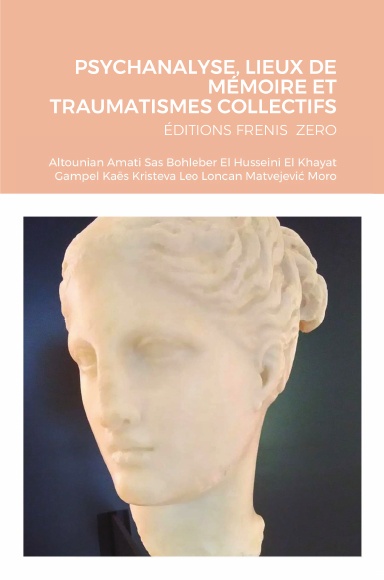
Writings by: J. Altounian, S. Amati Sas, W.
Bohleber, M. El Husseini, R. El Khayat, Y. Gampel R. Kaës, J.
Kristeva, G. Leo, A. Loncan, P. Matvejević, M.-R. Moro
Editore/Publisher: Edizioni Frenis Zero
ISBN: 978-88-97479-29-1
Anno/Year: 2020
Pages: 482
Click
here to order the book/Ordina
su Lulu

"Fear
of Lockdown. Psychoanalysis, Pandemic Discontents and
Climate Change"
edited by Giuseppe Leo
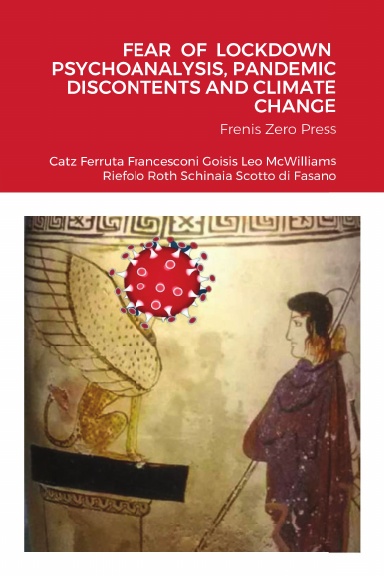
Writings by: H. Catz, A. Ferruta,
M. Francesconi, P. R. Goisis, G.
Leo, N. McWilliams,
G. Riefolo, M. Roth, C.
Schinaia, D. Scotto Di Fasano
Editore/Publisher: Edizioni Frenis Zero
ISBN: 978-88-97479-21-5
Anno/Year: 2020
Pages: 295
Click
here to order the book/Ordina
su Lulu

Click
here to buy the book/Compra su Amazon

"Rock
Music & Psychoanalysis"
Second Edition

Edited
by: Giuseppe Leo
Authored
by/autori: Lewis Aron Heather
Ferguson Joseph LeDoux Giuseppe Leo John Shaw
Rod Tweedy
Editore/Publisher:
Edizioni Frenis Zero
Collection/Collana: Borders
of Psychoanalysis
Anno/Year:
2020
Pagine/Pages:
221
ISBN:978-88-97479-35-2
Click
here to buy the book/Compra su Amazon

"Essere
nella cura"

Authored
by/autori: Giacomo Di Marco & Isabella
Schiappadori
Editore/Publisher:
Edizioni Frenis Zero
Collection/Collana: Confini
della Psicoanalisi
Anno/Year:
2019
Pagine/Pages:
210
ISBN:978-88-97479-17-8
Click
here to order the book
"Enactment
in Psychoanalysis"

Edited
by Giuseppe Leo & Giuseppe Riefolo
Writings
by: E. Ginot J.R.
Greenberg J. Kraus J.D. Safran
Publisher:
Frenis Zero
Collection:
Borders of Psychoanalysis
Year:
2019
Pages:
326
ISBN: 978-88-97479-15-4
Click
here to order the book
"Infant
Research and Psychoanalysis"

Edited
by Giuseppe Leo
Writings
by: B. Beebe K.
Lyons-Ruth J. P. Nahum E. Solheim C.
Trevarthen E. Z. Tronick L.
Vulliez-Coady
Publisher:
Frenis Zero
Collection:
Borders of Psychoanalysis
Year:
2018
Pages:
273
ISBN: 978-88-97479-14-7
Click
here to order the book
"Fundamentalism
and Psychoanalysis"
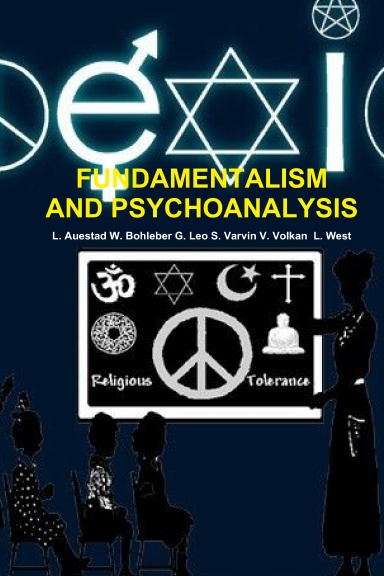
Edited
by Giuseppe Leo
Prefaced
by: Vamik D. Volkan
Writings
by: L. Auestad W.
Bohleber S. Varvin L. West
Publisher:
Frenis Zero
Collection:
Mediterranean Id-entities
Year:
2017
Pages:
214
ISBN: 978-88-97479-13-0
Click
here to order the book
"Psicoanalisi, luoghi della resilienza
ed immigrazione"
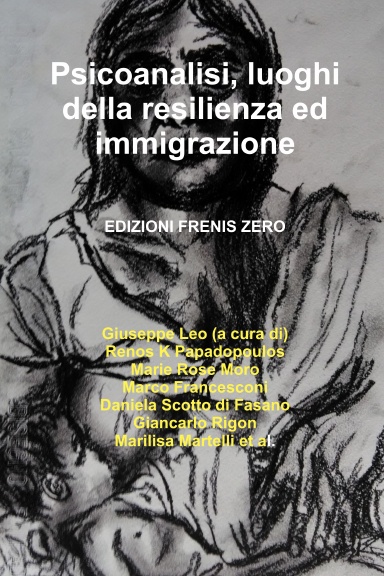
Edited
by/a cura di: Giuseppe Leo
Writings by/scritti di:
S.
Araùjo Cabral, L.
Curone,
M. Francesconi,
L.
Frattini,
S.
Impagliazzo,
D. Centenaro Levandowski, G. Magnani, M. Manetti, C. Marangio,
G. A. Marra e Rosa, M. Martelli,
M. R. Moro, R. K. Papadopoulos,
A. Pellicciari,
G. Rigon,
D.
Scotto di Fasano,
E. Zini, A. Zunino
Editore/Publisher: Edizioni Frenis Zero
Collection/Collana: Mediterranean
Id-entities
Anno/Year:
2017
Pagine/Pages:
372
ISBN:978-88-97479-11-6
Click
here to order the book
"Psicoanalisi in Terra Santa"

Edited
by/a cura di: Ambra Cusin & Giuseppe Leo
Prefaced by/prefazione
di:
Anna Sabatini Scalmati
Writings by/scritti di:
H. Abramovitch A. Cusin M. Dwairy
A. Lotem M.
Mansur M. P. Salatiello Afterword
by/ Postfazione
di:
Ch. U. Schminck-Gustavus
Notes by/ Note di: Nader Akkad
Editore/Publisher: Edizioni Frenis Zero
Collection/Collana: Mediterranean
Id-entities
Anno/Year:
2017
Pagine/Pages:
170
ISBN:978-88-97479-12-3
Click
here to buy the book
"Essere bambini a Gaza. Il trauma
infinito"

Authored
by/autore: Maria Patrizia Salatiello
Editore/Publisher: Edizioni Frenis Zero
Collection/Collana: Mediterranean
Id-entities
Anno/Year:
2016
Pagine/Pages:
242
ISBN:978-88-97479-08-6
Click
here to buy the book
Psychoanalysis,
Collective Traumas and Memory Places (English Edition)
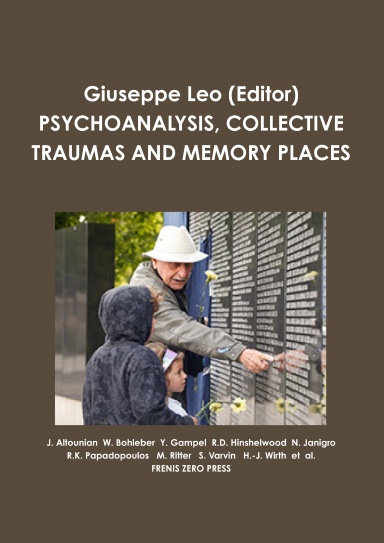
Edited
by/a cura di: Giuseppe Leo Prefaced by/prefazione
di:
R.D.Hinshelwood
Writings by/scritti di: J. Altounian
W. Bohleber J. Deutsch
H. Halberstadt-Freud Y. Gampel
N. Janigro R.K. Papadopoulos
M. Ritter S. Varvin H.-J. Wirth
Editore/Publisher: Edizioni Frenis Zero
Collection/Collana: Mediterranean
Id-entities
Anno/Year:
2015
Pagine/Pages:
330
ISBN:978-88-97479-09-3
Click
here to buy the book
"L'uomo
dietro al lettino" di
Gabriele Cassullodi
Gabriele Cassullodi
Gabriele Cassullo

Prefaced
by/prefazione di: Jeremy
Holmes
Editore/Publisher: Edizioni Frenis Zero
Collection/Collana: Biografie
dell'Inconscio
Anno/Year:
2015
Pagine/Pages:
350
ISBN:978-88-97479-07-9
Click
here to order the book
"Neuroscience
and Psychoanalysis" (English Edition)

Edited by/a cura di: Giuseppe Leo
Prefaced by/prefazione
di: Georg Northoff
Writings by/scritti di: D. Mann A. N. Schore
R. Stickgold
B.A. Van Der Kolk
G. Vaslamatzis M.P. Walker
Editore/Publisher: Edizioni Frenis Zero
Collection/Collana: Psicoanalisi e neuroscienze
Anno/Year: 2014
Pagine/Pages: 300
ISBN:978-88-97479-06-2
Click
here to order the book
Vera
Schmidt, "Scritti su psicoanalisi infantile ed
educazione"

Edited by/a cura di: Giuseppe Leo
Prefaced by/prefazione
di: Alberto Angelini
Introduced by/introduzione di: Vlasta Polojaz
Afterword by/post-fazione di: Rita Corsa
Editore/Publisher: Edizioni Frenis Zero
Collana: Biografie dell'Inconscio
Anno/Year: 2014
Pagine/Pages: 248
ISBN:978-88-97479-05-5
Click
here to order the book
Resnik,
S. et al. (a cura di Monica Ferri), "L'ascolto dei
sensi e dei luoghi nella relazione terapeutica"

Writings by:A.
Ambrosini, A. Bimbi, M. Ferri,
G. Gabbriellini, A. Luperini, S. Resnik,
S. Rodighiero, R. Tancredi, A. Taquini Resnik,
G. Trippi
Editore/Publisher: Edizioni Frenis Zero
Collana: Confini della Psicoanalisi
Anno/Year: 2013
Pagine/Pages: 156
ISBN:978-88-97479-04-8
Click
here to order the book
Silvio
G. Cusin, "Sessualità e conoscenza"

A cura di/Edited by: A. Cusin & G. Leo
Editore/Publisher: Edizioni Frenis Zero
Collana/Collection: Biografie dell'Inconscio
Anno/Year: 2013
Pagine/Pages: 476
ISBN: 978-88-97479-03-1
Click
here to order the book
AA.VV.,
"Psicoanalisi e luoghi della riabilitazione", a cura
di G. Leo e G. Riefolo (Editors)

A cura di/Edited by: G. Leo & G. Riefolo
Editore/Publisher: Edizioni Frenis Zero
Collana/Collection: Id-entità mediterranee
Anno/Year: 2013
Pagine/Pages: 426
ISBN: 978-88-903710-9-7
Prezzo/Price:
€ 39,00
Click
here to order the book
AA.VV.,
"Scrittura e memoria", a cura di R. Bolletti (Editor)

Writings by: J.
Altounian, S. Amati Sas, A. Arslan, R. Bolletti, P. De
Silvestris, M. Morello, A. Sabatini Scalmati.
Editore/Publisher: Edizioni Frenis Zero
Collana: Cordoglio e pregiudizio
Anno/Year: 2012
Pagine/Pages: 136
ISBN: 978-88-903710-7-3
Click
here to order the book
AA.VV., "Lo
spazio velato. Femminile e discorso
psicoanalitico"
a cura di G. Leo e L. Montani (Editors)

Writings by: A.
Cusin, J. Kristeva, A. Loncan, S. Marino, B.
Massimilla, L. Montani, A. Nunziante Cesaro, S.
Parrello, M. Sommantico, G. Stanziano, L.
Tarantini, A. Zurolo.
Editore/Publisher: Edizioni Frenis Zero
Collana: Confini della psicoanalisi
Anno/Year: 2012
Pagine/Pages: 382
ISBN: 978-88-903710-6-6
Click
here to order the book
AA.VV., Psychoanalysis
and its Borders, a cura di
G. Leo (Editor)
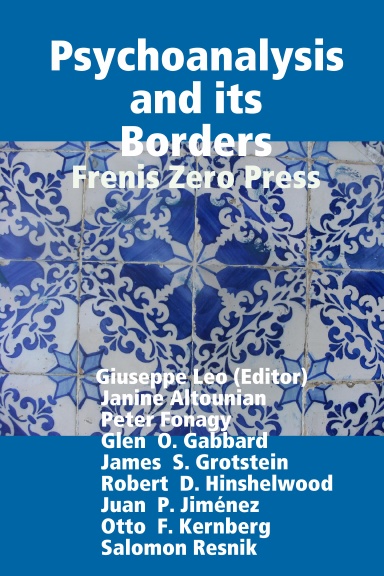
Writings by: J. Altounian, P.
Fonagy, G.O. Gabbard, J.S. Grotstein, R.D. Hinshelwood, J.P.
Jimenez, O.F. Kernberg, S. Resnik.
Editore/Publisher: Edizioni Frenis Zero
Collana/Collection: Borders of Psychoanalysis
Anno/Year: 2012
Pagine/Pages: 348
ISBN: 978-88-974790-2-4
Click
here to order the book
AA.VV.,
"Psicoanalisi e luoghi della negazione", a cura di A.
Cusin e G. Leo
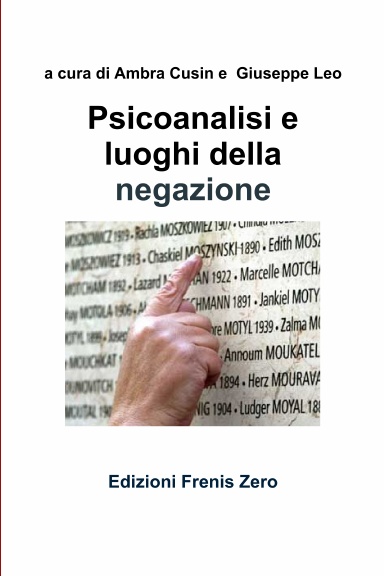
Writings by:J.
Altounian, S. Amati Sas, M. e M. Avakian, W. A.
Cusin, N. Janigro, G. Leo, B. E. Litowitz, S. Resnik, A.
Sabatini Scalmati, G. Schneider, M. Šebek,
F. Sironi, L. Tarantini.
Editore/Publisher: Edizioni Frenis Zero
Collana/Collection: Id-entità mediterranee
Anno/Year: 2011
Pagine/Pages: 400
ISBN: 978-88-903710-4-2
Click
here to order the book
"The Voyage Out" by Virginia
Woolf

Editore/Publisher: Edizioni Frenis Zero
ISBN: 978-88-97479-01-7
Anno/Year: 2011
Pages: 672
Click
here to order the book
"Psicologia
dell'antisemitismo" di Imre Hermann

Author:Imre Hermann
Editore/Publisher: Edizioni Frenis Zero
ISBN: 978-88-903710-3-5
Anno/Year: 2011
Pages: 158
Click
here to order the book
"Vite soffiate. I vinti della
psicoanalisi" di Giuseppe Leo

Editore/Publisher: Edizioni Frenis Zero
Edizione: 2a
ISBN: 978-88-903710-5-9
Anno/Year: 2011
Click
here to order the book
"La Psicoanalisi e i suoi
confini" edited by Giuseppe Leo

Writings by: J.
Altounian, P. Fonagy, G.O. Gabbard, J.S. Grotstein, R.D.
Hinshelwood, J.P. Jiménez, O.F. Kernberg, S. Resnik
Editore/Publisher: Astrolabio Ubaldini
ISBN: 978-88-340155-7-5
Anno/Year: 2009
Pages: 224
Prezzo/Price: € 20,00
"La Psicoanalisi. Intrecci Paesaggi
Confini"
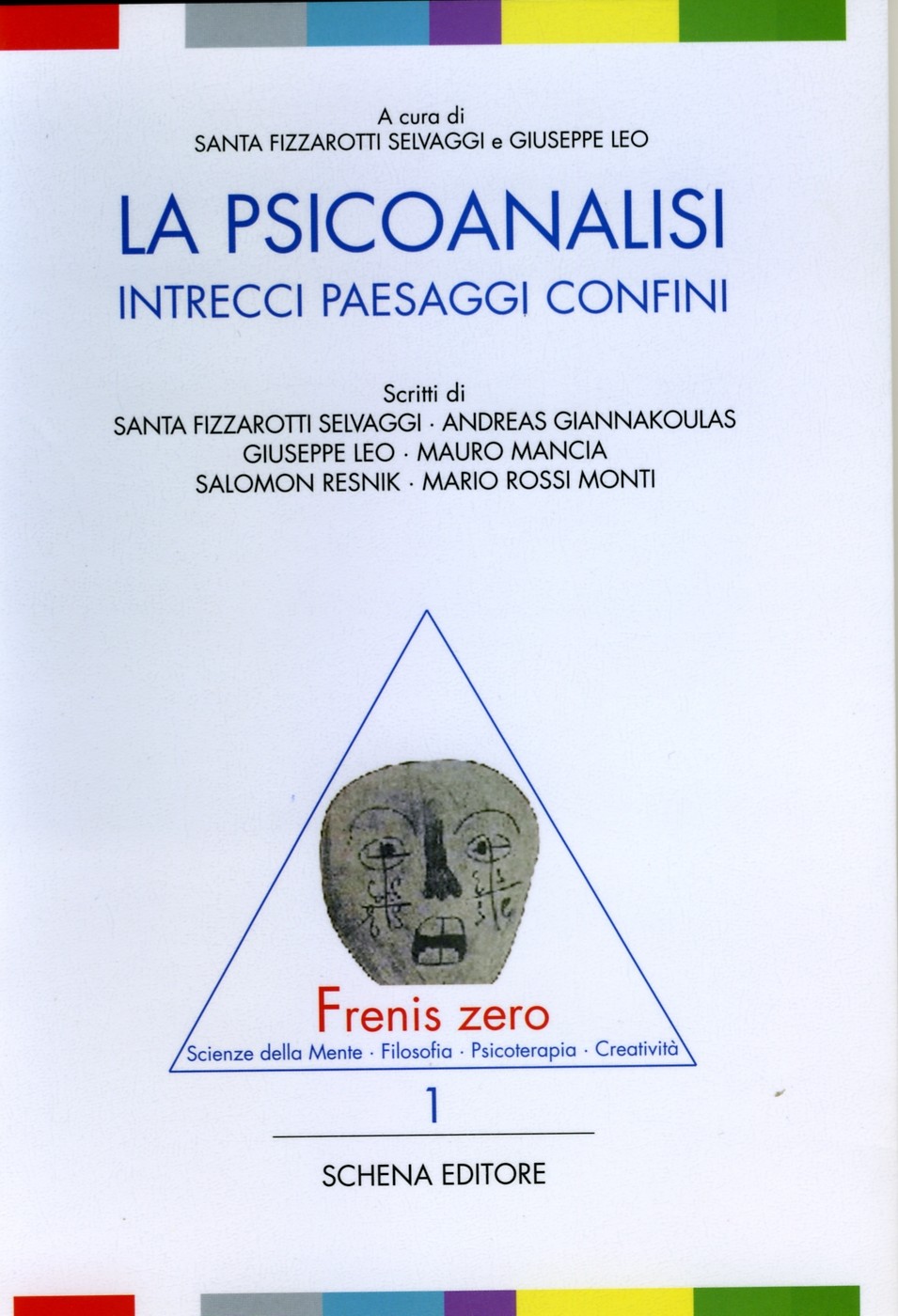
Edited by S. Fizzarotti Selvaggi, G.Leo.
Writings by: Salomon Resnik, Mauro Mancia, Andreas Giannakoulas,
Mario Rossi Monti, Santa Fizzarotti Selvaggi, Giuseppe Leo.
Publisher: Schena Editore
ISBN 88-8229-567-2
Price: € 15,00
Click here to order the
book |
|
Introduction
This
work stems from some of my thoughts herein reported following a
pilot project of psychological support on board an emergency rescue
ship in the Sicilian Channel.
The
organization behind the project is not mentioned for reasons of privacy1.
For the very same reasons, which are also related to the current European
policies in place, I have chosen to omit some parts of the
project concerning the actual reception of migrants and to focus mainly
on the group experience.
I
decide to accept the job and to get on board, feeling first and
foremost
called upon to act and compelled to give my own personal contribution,
however small, to the problem of immigration that today
takes the semblance of an apocalyptic exodus and of an emergency
with
no end in sight. The migrants’ journey usually lasts for months
if not years. Extreme traumas such as torture are an experience that
unites them along the migratory route. Many of them have survived
violence and shipwrecks and often witnessed the death of a loved
one or a traveling companion. The challenge therefore is to be able
to make thinkable this plight that speaks of war, death, imprisonment,
hunger
and fear.
In
keeping with my training I propose to get the many actors playing their
part in the life on board the rescue ship involved, whether they
be the single individual, the small group, the organizations concerned,
or
the migrants themselves. In order to come to grips with a movement
of such complexity in its entirety, it is important to look at it
from a unified and globalizing psychoanalytic perspective, which would
enable one to observe and give meaning to what is happening within
it. In other words, this means thinking and constructing a setting—i.e
the Multilayer Setting
(Margherita, 2012)—configured
as a
container
sufficiently strong as to be able to tolerate and modulate this
catastrophe, and sufficiently elastic to simultaneously organize the
different groups and the different points of view that are here involved
(crew, groups of rescuers, groups of health workers, groups in
rubber dinghies, groups of migrants, groups of smugglers and
traffickers, social
and health institutions, political organizations, etc.).
The
Complex Multilayer theory
(Margherita, 2012) shines a light
upon
the existence of complex concentric interrelations between the different
levels of the observed context—i.e. individual, group, institutional,
social—and
how each level affects the other. Communication
between
the different levels therefore becomes a focal point for therapy.
The
project presented here is, for the sake of clarity, divided into
two
distinct and targeted interventions: one for the onboard personnel, and
one for the migrants, always keeping in mind that individual interventions
interacting with each other, promote the well-being within
the ship context.
The
group with the ship’s crew
As
I make my way onto the ship I am overcome by mixed emotions of excitement
and curiosity about the new experience and by the desire to
put myself to the test in a world that is all but unfamiliar to me.
In
less than two days at sea, far away from family and the customary technological
means of communication, this world, at first unknown
to me, begins to transform itself into a large, welcoming and affective
family. In my first explorations, full of analytical curiosity, I notice
that in this large family there are several subgroups
organized not
only by their competencies and duties, but also by their sharing of certain
spaces such as the canteen and accommodation quarters.
The
crew that works on a ship is specialized in different areas and organized
hierarchically. There is a commander, who coordinates the subordinates
and is also the person responsible for them, followed by the
second in command. Finally, the nautical tradition distinguishes the
officers from the crew that together make up the entire naval company.
The crew, in addition to being expected to owe obedience to
their superiors and to scrupulously follow the directives imparted by
them, are required to work in synergy and co-operation to ensure
the
safety of the ship.
From
the outset, I have the impression that this type of organization creates
family micro-systems which, if on the one hand seem to communicate
in an exemplary way with a sort of universal language that
binds and creates brotherly
ties during emergencies
caused by SAR2
events, on the other they seem to adopt, just as the migrants hosted
on board, specific dialects and cultures, dictated perhaps by the
close cohabitation of some sub-groups
in circumscribed areas of the
ship.
With
this in mind, I thought of getting the crew involved resorting to
the experiential group
model. An operational
characteristic of the model
is the group’s own examination of the group itself, with the focus
on the lived experience shared by the participants. The experiential group
‘. . . is the space-time of the crossing of experiences, and as
they cross it turns into learning that ultimately confers to the
single individuals
the tools for the encounter with other and new group forms’
(Brunori and Tenerini, 2017). As well as making it easier to recognize
group phenomena the model facilitates the development of a
greater capacity for co-operation within a social situation, even in
extreme
emotional conditions (Corrao, 1982; Kaës, 1976).
This
short introductory note shows that the experiential
group proposed here
could indeed take on the role of communicative
facilitator between
the various host sub-groups on the ship. A group already there,
waiting only to be nominated and constituted by a setting
with well-defined
times and
spaces.
A
time which
goes beyond both the moments of ordinary work or
emergency,
(SAR-events), and the activities of a playful nature, distinctive of
the free time. A space,
where the group can engage in sharing
strong emotional experiences in order to develop a greater capacity
for co-operation within complex social situations. A place
understood
both as a physical and concrete space which, as an away
place,
can perform the function of decompression chamber of emotional
residues
derived
from difficult and sometimes extreme work situations,
taking care of the emotional events related to the institutional life.
With
that in mind, I make the assumption that the participants of
the
group are able to take charge of the institutional mandate. I also assume
that the ideas of foundation and identity of the group are strongly
based on the historical
qualities of the institution
with its founding
myths. We could therefore think that the members of the group,
in the capacity of institutional representatives, are delegated to deal
with the unconscious things
that pervade the field.
Indeed,
as after every SAR event, I notice there is a greater turnout of
participants to the group, as if there is an urgent need to find a place
of gathering—a decompression
chamber—to defuse those intense
emotional experiences.
Participation
in the group as already mentioned is on a voluntary basis.
The group is open, anyone can join in regardless of the role of office
and the function performed (commander, officers, crew, health workers);
the commander is there to ensure that the group is provided with
a protected space, a space-place, which is assigned to us every day
from 4.00pm to 5.30pm, unless there are other types of priority interventions
in progress.
The
commander will participate in only one of the meetings, the
third,
entitled ‘fathers
and Sons’, of which I
shall now give a short summary.
The
commander takes the floor and seems to want to share some of his
mood with great generosity. He recounts the first two days of
navigation, as
of melancholic and gloomy days; he misses his loved ones.
Then,
with the passage of time, this initial melancholy wanes, until it becomes
more and more immaterial. He feels embarrassed about this detachment,
which he does not like, as it makes him feel bad. I think back
to the events of the last meeting and I refer to the intervention of L.
who used an analogy to explain the role that the captain plays on the ship.
The captain is akin to a paternal figure, the father who sets out well-defined
laws and rules. The second in command is a maternal figure,
the caring mother who takes care of her children. Two distinct
functions
that cooperate and work in synergy.
I
think of how, from this point of view, the captain being the head
of
a family can take on the role of father of the crew, which guarantees laws
and rules to their children, promoting their consolidation of an
‘esprit de corps’. I report these thoughts to the group.
In
a relaxed atmosphere working by associations the group members talk
about their own children. A nostalgic atmosphere hangs over the meeting
due to an awareness of not being able to give them the time they
need. An increasingly uncertain time, given by the sudden changes in
programme on the ship; it is, after all, a time of emergency.
C.
says how proud he is of his boys, outstanding in school, in sport, in
dance and in music. Visibly moved, he describes the hard and long struggle
faced to obtain the adoption of his African children. This struggle,
rewarded by great satisfaction, but not without pain, would seem
to retrace the historical
memory of the ship, engaged
for years in
the difficult rescue operations of men, women and thousands of migrant
children. I suppose that C. through the ritual
of story-telling is
unwittingly taking charge of the mandate itself. I also surmise that some
of the critical issues that emerged from the emotional experience
of
the group experience would seem to be due to a lack of information
and
communication of the institutional mandate, as shown by the
painful emotional experience of uncertainty suffered by the crew.
The
state of emergency, dictated by the migratory flow and by the SAR
events, causes an official and pre-established calendar concerning the
departure and return dates of the ship to be cast aside, putting the
stability of the ‘institutional
guarantor’ into jeopardy.
In
such a case scenario the uncertainty,
like the rising of a poisonous and
insidious silent gas, would be likely to contaminate the institutional
container
causing the crew to live in a state of significant emotional distress.
In addition to this, such a predicament appears to trigger emotions
like anguish, fear, reluctance and anger. Anger expressed in the
form of foreigner-phobia or xenophobia, fear of the stranger, of the
alien
mentality, of the disease, which could infect
the whole ship.
The
meeting, entitled ‘explosion
and contagion’, is well
suited to
represent
this aspect. An immediate discontent emerges, perhaps dictated by
yesterday’s SAR event.
It
is A. who addresses the session next. He expresses his disappointment concerning
the SAR events. T. empathizes with him animatedly, protesting
with anger against the hard work done after the events. The fully-staffed
crew, among the various functions performed, in addition to
the rescue—has to clean, decontaminate and disinfect the areas of the
ship allocated for reception—from the dirt and from the migrants’ excrement.
A sort of contamination
frenzy abounds, which is
accompanied by
the terror of contracting diseases, bringing them back into the
bosom of one’s own family. They harbor resentment against the
system,
the authorities, the institutions, which seem no longer to be able
to guarantee them any security. Security that seems to fail not only
for the terror of being
contaminated or the
explosion of a virus, but
also for real explosions, such as those due to hypothetical terrorist attacks
or the imagined explosion of a boat of migrants. T. explains how
the non-existent navigation rules, dictated by the smugglers,
frequently put
not only the life of the migrants, but also that of the crew—appointed
to carry out the rescue operations—in danger. In most
cases, the boats are loaded with fuel and the idea of being under the
threat of explosions is not completely far-fetched.
T.’s
contribution momentarily throws the session into a state of
chaos.
The language of the group takes the form of logorrhea.
Words seem
to overflow like a flooding river and leave no room for any form
of creative thought. Paranoia
enters the scene. The other,
the foreigner,
is no longer accepted but feared as an enemy in fight.
Personally,
I feel confused and invaded by objects overburdened with violence,
rage and fury.
Incidentally,
it is well known that in order to protect itself from the paranoid
anguish triggered
by the confusion of the unknown, the institution
could turn the internal persecutor into an external enemy.
The
institution has in practice among its various mandates that of
managing
and processing the disturber,
the new, the different, the
otherness.
Near
the end, after a short spell of silence, someone remembers a
touching
moment concerning the events of the previous day, namely the
choral singing improvised by the crew to reassure the women during
their rescue and then adds: ‘We don’t have anything against them,
but against this European way of doing business . . . it’s all about
money’.
Moreover,
the
strong spirit of interdependence and the team’s
togetherness,
which characterize the crew of a ship, act as a counterbalance to
the critical situations described above, helping the transformation of
the darkest emotions and passions.
The
fourth meeting entitled ‘reluctance
↔ reception’
begins with
voice
being given to an acute discomfort. The group, in a sort of ritualized
repetition,
describes the filth, faeces, blood, vomit and whatever else
it is they are forced to clean up after each SAR event. The working
group seems to regress to the state of a primitive group, which
is fierce and cruel. Anger takes over and the contamination
frenzy
returns
with a vengeance. Humanity and compassion seem to have
vanished into thin air, but the fleetingness of the moment is broken
by the intervention of M. who does not agree with the group, remembering
that one of the goals of the mission is to save lives; he then
adds ‘it isn’t their fault’.
The
group, in fight-flight
basic assumption (Bion,
1961), fiercely
attacks
M. who is enacting roles that have been split, projected and rejected
by the group.
I
suppose that in order to open up to the otherness and the acceptance of
other cultures the group has had to go through a morbid process that
involves being
infected. The following
quote by Corrente concurs
with that: ‘In this sense I think of the disease that once
disseminated in
the field . . . spreads like a plague, of which we all get infected,
so the so-called individual disease, if any existed, becomes ‘socialized’
in the field . . . Without dissemination and contamination, a
cure cannot be found’ (Corrente, 2014).
I
try my best and just about manage to control the turmoil of the
moment,
urging M. to carry on. Gasping for air, with a knot in his throat
and his eyes full of tears, M. says that in every child rescued he sees
his own children away from home—just
this in itself is worth all the
sacrifices made so far.
That
split-second of strong emotional involvement infects
everyone.
Having
being moved, the group agrees with M., who with his
intervention
seems to have triggered a transformative process of
identification.
Thus,
fear, reluctance and rage give way to reassurance, hospitality and
compassion, as to mark the beginning of a reparative and cohesive process
of fragmented parts.
These
same principles of solidarity and collaboration seem to have opened
the door to the birth of a shared culture of hospitality, fostering the
onset of a process of integration through the opening of a dialogue
which, proceeding
through the chaos of emotions,
gets the different
and complex sub-groups that are hosted on the ship involved.
The
ship, as it turns out, in addition to the crew and health workers, gives
its welcome to another population, complex and varied in terms of
origin, culture, language, history, affiliation and life path. It is
the population
of the migrant guests.
The
work of receiving the migrants on board Once
the migrants have boarded, the entire staff of the ship revolves around
them to ensure, in addition to safety, medical and psychological support,
the satisfaction of primary needs such as the comforts of
food and water as well as toilet facilities. Women and children
are welcomed and given shelter indoors, while the men stay
outdoors. The pace of work dictated by the emergency is very
rapid.
Some arrive in precarious psycho-physical conditions.
Confronting
the sea brings with it both the hope for the end of an
interminable
journey and the signs of terror experienced in the dangers faced
at sea, since most of them have no prior knowledge of these
dangers and cannot swim. Very telling are the looks on their faces,
sometimes lost in the void, sometimes full of suffering and anguish,
and etched in the indelible scars they carry upon their features and/or
psyche. Fragmentation, disorientation, fear, are elements that
constantly accompany them and that seem to evoke the painful
experience of uncertainty,
the very thing suffered and put into
words by the crew.
During
the first three rescue operations we picked up and looked
after
about 130 people per event. Their stay on board did not last
more
than six hours, an inadequate amount of time to make a targeted psychological
intervention feasible; enough time to ‘receive’
and gather
important
observations.
Vivid
in my memories among them is a child, around five years
old,
with beautiful features and a well-groomed appearance. His serious, stunned
and dazed look causes him to remain under my observation for
longer than the others. We inflate a glove of blue latex, drawing
a smiley on
it; it looks funny, it looks like a puppet and we call
it Charley. This simplest of actions is enough for my preoccupation to
turn into a pleasant surprise. The serious expression on the child’s
face now breaks into a smile, we make the balloon fly up in the
air and start playing together.
Charley
the
balloon, in the guise of an imaginary saving friend,
conceived
and created for children in the here and now by the crew, promotes
the birth of an emotional, empathic way to share and communicate.
A
way to share, such as the one just mentioned is fundamental
to
the reception process.
Again,
I have seen women of different ethnic backgrounds, getting dehydrated,
with symptoms of nausea and vomiting, probably due to a
severe seasickness. Once hydrated and fed, it did not take much to encourage
the formation of spontaneous groups to promote the birth of
an enthralling musical choir. I abandoned myself to their singing, accompanying
them with the clapping of my hands, in a soothing rhythmic
harmony.
In
conclusion, I would like to pause briefly on the last SAR event
in
which we rescued more than 1000 people (from boats and dinghies).
The
breakneck and incessant pace dictated by a rescue operation
of
this magnitude does not leave room for any set procedure that
would
provide for the needs of the moment. During that period of
time
(lasting more than 50 hours), each one of us contributes to the primary
needs of the migrant guests of the ship, carrying out tasks which
fall outside our competencies in order to bring everyone safe and
sound onto the mainland (I myself have collaborated in the packaging and
distribution of meals).
Requests
by migrants (water, food, milk, diapers, blankets, use of
toilets,
medicine) in an event of this magnitude increase exponentially.
Requests
to which we do not know how and to what extent we
can
respond, other than through taking collective
action—sometimes we
do not even understand if they are requests for attention, recognition
or
calls for help elicited by real and compelling needs.
A
new form of language enters the scene. It is the language of significant
action,
where doing—i.e.
the act of working in concert to save human
lives—paves the way for the formation of a strong sense of belonging.
This is what, within the macro-groupal
complexity, Margherita
calls acted-out
interpretations (2011a;
2011b), namely the interpretations
that the group gives itself through its own taking
action.
Conclusions
Looking
back to the initial quote by Bion, once on dry land I asked myself
several times how it was possible to go through a
disembarking
operation of such magnitude without suffering any
wounds
or injuries.
I
do not know and cannot answer this question, but I can assume
that
in extreme emergency situations like this the group’s experience, through
the sharing of emotions, can unite, connect, and fraternize.
The
group creates a climate of collaboration and solidarity, a universal language
made of looks and small gestures, a dialogue between cultures
which, through the contagious process of contact, promotes the
birth of a shared culture of acceptance—witness to the strong ‘esprit
de corps’, which emerged and as told by the crew during the experiential
groups.
Notes
1. All references to institutions and people engaged
in real situations have
been made unrecognizable for reasons of privacy.
2. Search
and rescue—the
term refers mainly to what happens in the Sicilian
Channel during the migratory movements.
References
Bion WR (1961) Experiences
in Groups. London:
Tavistock Publications.
Bion WR (1974) Bion’s
Brazilian lectures 2.
Rio de Janeiro: Imago Editora. (Reprinted
in London: Karnac Books, 1990).
Brunori P and Tenerini A (2017) Il modello del gruppo
esperienziale: transiti e
apprendimento. [The Experiential group model:
transitions and learning]. Koinos.
Gruppo e Funzione Analitica. Nuova Serie V(1).
Roma: Edizioni Magi.
Corrao F (1982) Psicoanalisi
e ricerca di gruppo.
[Psychoanalysis
and group
research ].
Orme (II). Milano: Cortina, 1998.
Corrente G (2014) Funzione polioculare e vitalità
psichica. [Multiple visual function
and psychic vitality]. Koinos.
Gruppo e Funzione Analitica. Nuova Serie II
(2).
Roma: Edizioni Magi.
Margherita G (2011a) La funzione analitica in contesti
gruppali non terapeutici.
[The analytical function in non-therapeutic group
contexts]. Koinos.
Gruppo e
Funzione Analitica XXXII
(2). Roma: Borla.
Margherita G (2011b) The eye of the fly:
psychoanalytic Gestalten and chaotic attractors
in large groups and institutions. Chaos
and complexity letters IV (3).
Del Bono: Emergency at sea 11
Margherita G (2012) L’insieme
multistrato. Gruppi, Masse, Istituzioni tra Caos e
Psicoanalisi .
[The
Multilayer set. Groups, Masses, Institutions between Chaos
and Psychoanalysis ].
Roma: Armando.
Kaës R (1976) L’appareil
psychique groupal.
[The group
psychic apparatus].
Paris:
Dunod.
XXXXXXXXXXXXXXXXXXX XXXXXXXXXXXXXXXXXXX XXXXXXXXXXXXXXXXXXX XXXXXXXXXXXXXXXXXXX XXXXXXXXXXXXXXXXXXX XXXXXXXXXXXXXXXXXXX XXXXXXXXXXXXXXXXXXX XXXXXXXXXXXXXXXXXXX XXXXXXXXXXXXXXXXXXX XXXXXXXXXXXXXXXXXXX XXXXXXXXXXXXXXXXXXX XXXXXXXXXXXXXXXXXXX XXXXXXXXXXXXXXXXXXX XXXXXXXXXXXXXXXXXXX XXXXXXXXXXXXXXXXXXX XXXXXXXXXXXXXXXXXXX XXXXXXXXXXXXXXXXXXX XXXXXXXXXXXXXXXXXXX XXXXXXXXXXXXXXXXXXX XXXXXXXXXXXXXXXXXXX XXXXXXXXXXXXXXXXXXX XXXXXXXXXXXXXXXXXXX XXXXXXXXXXXXXXXXXXX XXXXXXXXXXXXXXXXXXX XXXXXXXXXXXXXXXXXXX XXXXXXXXXXXXXXXXXXX XXXXXXXXXXXXXXXXXXX XXXXXXXXXXXXXXXXXXX XXXXXXXXXXXXXXXXXXX XXXXXXXXXXXXXXXXXXX XXXXXXXXXXXXXXXXXXX XXXXXXXXXXXXXXXXXXX XXXXXXXXXXXXXXXXXXX XXXXXXXXXXXXXXXXXXX XXXXXXXXXXXXXXXXXXX XXXXXXXXXXXXXXXXXXX XXXXXXXXXXXXXXXXXXX XXXXXXXXXXXXXXXXXXX XXXXXXXXXXXXXXXXXXX XXXXXXXXXXXXXXXXXXX XXXXXXXXXXXXXXXXXXX XXXXXXXXXXXXXXXXXXX XXXXXXXXXXXXXXXXXXX XXXXXXXXXXXXXXXXXXX XXXXXXXXXXXXXXXXXXX XXXXXXXXXXXXXXXXXXX XXXXXXXXXXXXXXXXXXX XXXXXXXXXXXXXXXXXXX XXXXXXXXXXXXXXXXXXX XXXXXXXXXXXXXXXXXXX XXXXXXXXXXXXXXXXXXX XXXXXXXXXXXXXXXXXXX XXXXXXXXXXXXXXXXXXX XXXXXXXXXXXXXXXXXXX XXXXXXXXXXXXXXXXXXX XXXXXXXXXXXXXXXXXXX XXXXXXXXXXXXXXXXXXX XXXXXXXXXXXXXXXXXXX XXXXXXXXXXXXXXXXXXX XXXXXXXXXXXXXXXXXXX XXXXXXXXXXXXXXXXXXX XXXXXXXXXXXXXXXXXXX XXXXXXXXXXXXXXXXXXX XXXXXXXXXXXXXXXXXXX XXXXXXXXXXXXXXXXXXX XXXXXXXXXXXXXXXXXXX XXXXXXXXXXXXXXXXXXX XXXXXXXXXXXXXXXXXXX XXXXXXXXXXXXXXXXXXX XXXXXXXXXXXXXXXXXXX XXXXXXXXXXXXXXXXXXX XXXXXXXXXXXXXXXXXXX XXXXXXXXXXXXXXXXXXX XXXXXXXXXXXXXXXXXXX XXXXXXXXXXXXXXXXXXX XXXXXXXXXXXXXXXXXXX XXXXXXXXXXXXXXXXXXX XXXXXXXXXXXXXXXXXXX XXXXXXXXXXXXXXXXXXX XXXXXXXXXXXXXXXXXXX XXXXXXXXXXXXXXXXXXX XXXXXXXXXXXXXXXXXXX XXXXXXXXXXXXXXXXXXX XXXXXXXXXXXXXXXXXXX XXXXXXXXXXXXXXXXXXX XXXXXXXXXXXXXXXXXXX XXXXXXXXXXXXXXXXXXX XXXXXXXXXXXXXXXXXXX XXXXXXXXXXXXXXXXXXX XXXXXXXXXXXXXXXXXXX XXXXXXXXXXXXXXXXXXX XXXXXXXXXXXXXXXXXXX XXXXXXXXXXXXXXXXXXX XXXXXXXXXXXXXXXXXXX XXXXXXXXXXXXXXXXXXX XXXXXXXXXXXXXXXXXXX XXXXXXXXXXXXXXXXXXX |
|
|
|
|
|
|
|
|
|
|
|
|
|
|
|
|
|
|
|
|
|
|
|
|
|







































